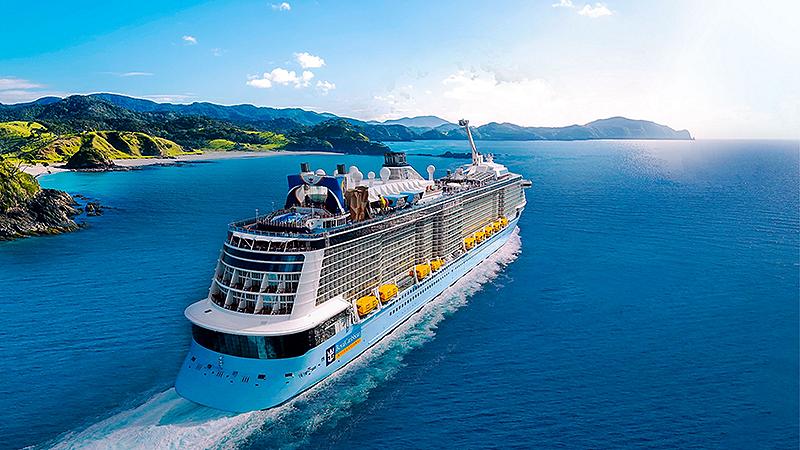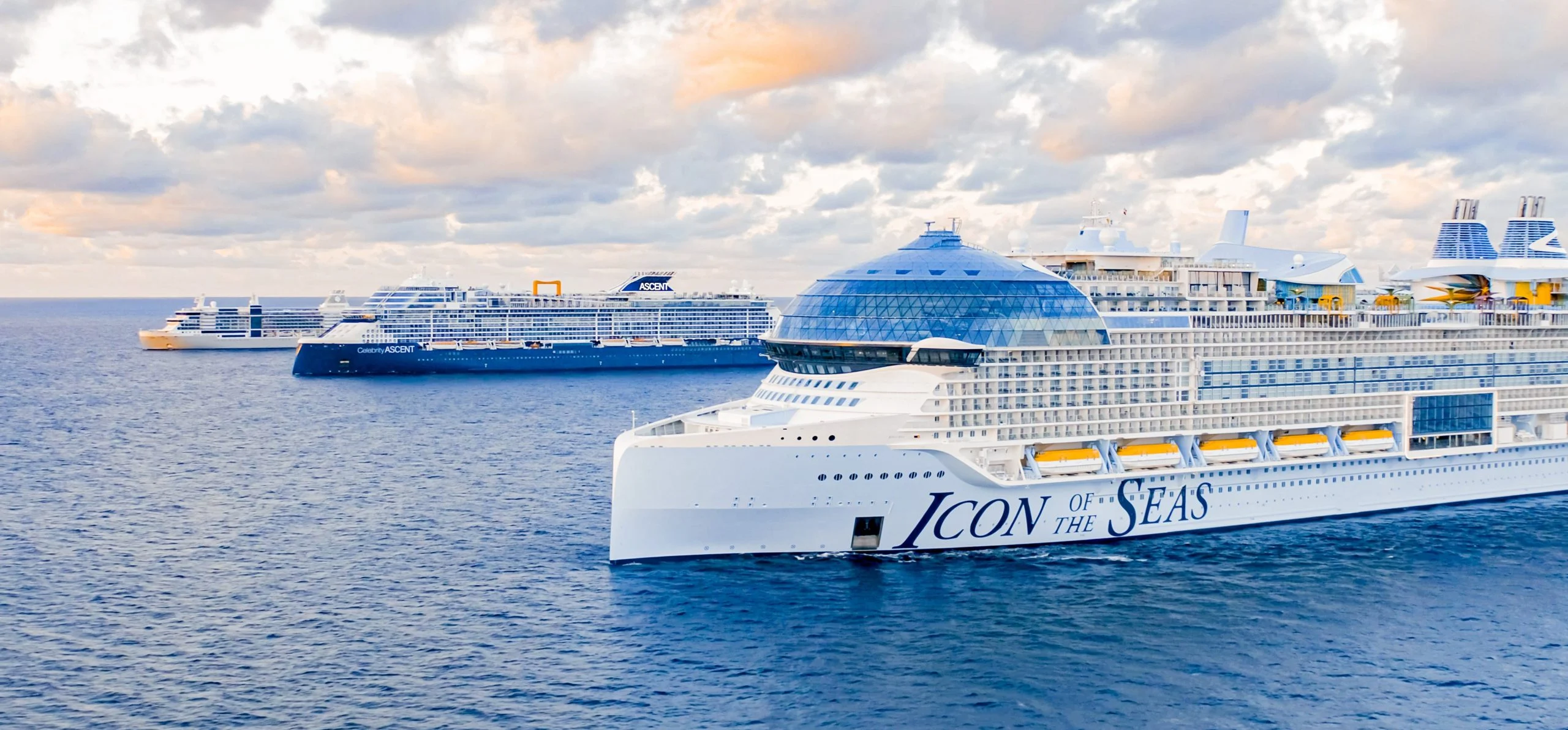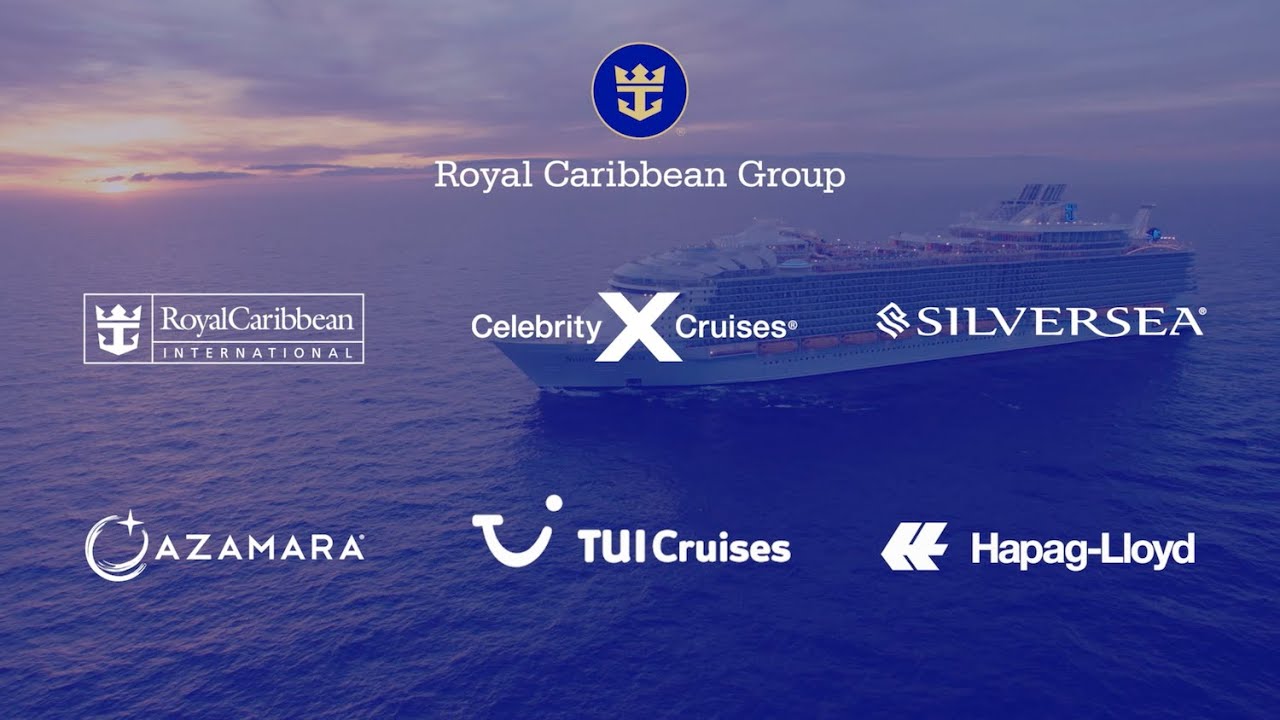Royal Caribbean Shares Up 2% Following Q3 Beat & Guidance Raise

Shares of Royal Caribbean (NYSE:RCL) saw a rise of over 2% intra-day today due to impressive third-quarter results and an upward revision in their guidance.
For the third quarter, the cruise company posted an adjusted EPS of $3.85, surpassing the expected $3.47. Their revenue also witnessed a 39% growth, reaching $4.16 billion and exceeding the anticipated $4.05 billion.
The superior performance, as stated by the company, can be attributed to heightened demand in last-minute bookings and a notable increase in onboard revenue.
Moreover, based on the robust demand and continued onboard revenue growth, Royal Caribbean raised its forecast for the full-year adjusted EPS to a range of $6.58 to $6.63, which is considerably higher than the previously estimated consensus of $6.15.
| Symbol | Price | %chg |
|---|---|---|
| SONA.JK | 4500 | -2.67 |
| 032350.KS | 19390 | 4.59 |
| PANR.JK | 700 | -3.57 |
| 039130.KS | 52600 | 0.19 |

Royal Caribbean Cruises Ltd. (NYSE:RCL) Price Target and Financial Performance Insights
- Patrick Scholes from Truist Financial set a price target of $337 for NYSE:RCL, indicating a potential increase of 0.91%.
- The Q2 2025 earnings call highlighted a trend of younger travelers driving cruise bookings, positively impacting growth.
- Despite a profit beat and an improved full-year outlook, a slight revenue miss and a disappointing outlook for the current quarter led to a stock price decrease of 0.17%.
Royal Caribbean Cruises Ltd. (NYSE:RCL) is a major player in the global cruise industry, offering a wide range of cruise experiences. On July 30, 2025, Patrick Scholes from Truist Financial set a price target of $337 for RCL. At that time, the stock was trading at $333.96, indicating a potential increase of 0.91%.
The company's recent Q2 2025 earnings call, held on July 29, 2025, provided insights into its financial performance and strategic initiatives. Key participants included corporate representatives Blake Vanier and Jason T. During the call, CEO Jason Liberty highlighted a trend of younger travelers driving cruise bookings, which is positively impacting the company's growth.
Despite the growing demand for cruises, RCL's stock has faced challenges. The stock price has decreased by 0.17% to $333.79, with fluctuations between $329.57 and $337.71 today. This decline is due to a slight revenue miss and a disappointing outlook for the current quarter, overshadowing a profit beat and an improved full-year outlook.
RCL's market capitalization stands at approximately $90.64 billion, reflecting its significant presence in the industry. The stock has seen a high of $355.91 and a low of $130.08 over the past year. Today's trading volume is 870,964 shares, indicating active investor interest in the company's performance and future prospects.

Royal Caribbean Shares Drop Despite Earnings Beat As Revenue Slightly Misses
Royal Caribbean Group (NYSE:RCL) posted second-quarter earnings ahead of expectations, but shares declined over 5% as revenue narrowly missed forecasts.
Adjusted earnings per share stood at $4.38, surpassing the $4.08 analyst estimate. Revenue came in at $4.54 billion, just under the $4.55 billion consensus, despite strong travel demand.
The company hosted 2.3 million guests in the quarter, a 10% increase year-over-year. Load factors reached 110%, while net yields rose 5.3% versus Q2 2024, reflecting growth across new and existing ships through stronger ticket pricing and onboard spending.
Royal Caribbean lifted its full-year 2025 adjusted EPS outlook to $15.41–$15.55, compared to analyst expectations of $15.45. The improved guidance stems from strong Q2 results and lower costs.
For Q3, the company projected adjusted EPS between $5.55 and $5.65. Net yields are expected to rise 2.3% to 2.8% year-over-year.

Royal Caribbean (NYSE:RCL) Maintains Positive Outlook Amid Market Volatility
Royal Caribbean (NYSE:RCL) is a prominent player in the Leisure and Recreation Services sector, known for its extensive cruise offerings. The company competes with other major players like Carnival Corporation and Norwegian Cruise Line. On March 25, 2025, Susquehanna reaffirmed its Positive rating for RCL, advising investors to hold their positions. At that time, RCL's stock price was $225.02.
Investors looking for value stocks in this sector might consider RCL and Airbnb, Inc. (ABNB). According to Zacks Investment Research, RCL holds a Zacks Rank of #2 (Buy), indicating a stronger earnings outlook compared to Airbnb's Zacks Rank of #3 (Hold). This suggests that RCL may be a more attractive option for value investors due to its improved earnings estimates.
RCL's stock price of $225.02 reflects a slight decrease of 0.38, or approximately -0.17%. The stock has traded between $223.17 and $227.32 today. Over the past year, RCL's stock has seen a high of $277.08 and a low of $125.06, showcasing its volatility in the market.
The company's market capitalization is approximately $60.56 billion, indicating its significant presence in the industry. With a trading volume of 1,677,291 shares on the NYSE, RCL remains an actively traded stock, attracting the attention of investors and analysts alike.

Royal Caribbean (NYSE:RCL) Maintains Positive Outlook Amid Market Volatility
Royal Caribbean (NYSE:RCL) is a prominent player in the Leisure and Recreation Services sector, known for its extensive cruise offerings. The company competes with other major players like Carnival Corporation and Norwegian Cruise Line. On March 25, 2025, Susquehanna reaffirmed its Positive rating for RCL, advising investors to hold their positions. At that time, RCL's stock price was $225.02.
Investors looking for value stocks in this sector might consider RCL and Airbnb, Inc. (ABNB). According to Zacks Investment Research, RCL holds a Zacks Rank of #2 (Buy), indicating a stronger earnings outlook compared to Airbnb's Zacks Rank of #3 (Hold). This suggests that RCL may be a more attractive option for value investors due to its improved earnings estimates.
RCL's stock price of $225.02 reflects a slight decrease of 0.38, or approximately -0.17%. The stock has traded between $223.17 and $227.32 today. Over the past year, RCL's stock has seen a high of $277.08 and a low of $125.06, showcasing its volatility in the market.
The company's market capitalization is approximately $60.56 billion, indicating its significant presence in the industry. With a trading volume of 1,677,291 shares on the NYSE, RCL remains an actively traded stock, attracting the attention of investors and analysts alike.

Royal Caribbean Group's Strong Financial Performance in Q4 2024
- Royal Caribbean Group (NYSE:RCL) reported an earnings per share (EPS) of $1.63, surpassing the estimated $1.50.
- The company achieved year-over-year revenue growth, increasing from $3.33 billion to $3.76 billion, despite slightly missing estimates.
- Royal Caribbean's stock price experienced positive movement, reflecting the fourth consecutive quarter of surpassing consensus EPS estimates.
Royal Caribbean Group, listed as NYSE:RCL, is a prominent player in the cruise industry, offering a wide range of vacation experiences through its diverse fleet. The company competes with other major cruise lines like Carnival Corporation and Norwegian Cruise Line Holdings. On January 28, 2025, Royal Caribbean reported earnings per share (EPS) of $1.63, exceeding the estimated $1.50, showcasing its strong financial performance.
During the Q4 2024 earnings call, key figures like CEO Jason Liberty and CFO Naftali Holtz discussed the company's financial results and strategic initiatives. Despite revenue slightly missing the $3.76 billion estimate, the company achieved year-over-year growth, with revenue increasing from $3.33 billion in the same period last year. This growth is attributed to strong pricing and onboard revenue strength.
Royal Caribbean's stock price saw positive movement following the earnings release, as highlighted by the Zacks Consensus Estimate. The company reported an 8.67% earnings surprise, with EPS improving from $1.25 in the previous year. This marks the fourth consecutive quarter of surpassing consensus EPS estimates, reflecting consistent financial performance.
The company's financial metrics provide insight into its market valuation. With a P/E ratio of 25.10, investors are willing to pay $25.10 for every dollar of earnings. The price-to-sales ratio of 4.38 and enterprise value to sales ratio of 5.62 indicate the market's valuation of Royal Caribbean's revenue and total worth. However, a debt-to-equity ratio of 2.75 suggests significant reliance on debt financing.
Despite these financial achievements, Royal Caribbean faces potential liquidity challenges, as indicated by a current ratio of 0.17. This ratio measures the company's ability to meet short-term obligations, and a low value may suggest difficulties in covering these liabilities. Nonetheless, the company's earnings yield of 3.98% offers a return on investment for shareholders, highlighting its profitability.

Royal Caribbean Group's Strong Financial Performance in Q4 2024
- Royal Caribbean Group (NYSE:RCL) reported an earnings per share (EPS) of $1.63, surpassing the estimated $1.50.
- The company achieved year-over-year revenue growth, increasing from $3.33 billion to $3.76 billion, despite slightly missing estimates.
- Royal Caribbean's stock price experienced positive movement, reflecting the fourth consecutive quarter of surpassing consensus EPS estimates.
Royal Caribbean Group, listed as NYSE:RCL, is a prominent player in the cruise industry, offering a wide range of vacation experiences through its diverse fleet. The company competes with other major cruise lines like Carnival Corporation and Norwegian Cruise Line Holdings. On January 28, 2025, Royal Caribbean reported earnings per share (EPS) of $1.63, exceeding the estimated $1.50, showcasing its strong financial performance.
During the Q4 2024 earnings call, key figures like CEO Jason Liberty and CFO Naftali Holtz discussed the company's financial results and strategic initiatives. Despite revenue slightly missing the $3.76 billion estimate, the company achieved year-over-year growth, with revenue increasing from $3.33 billion in the same period last year. This growth is attributed to strong pricing and onboard revenue strength.
Royal Caribbean's stock price saw positive movement following the earnings release, as highlighted by the Zacks Consensus Estimate. The company reported an 8.67% earnings surprise, with EPS improving from $1.25 in the previous year. This marks the fourth consecutive quarter of surpassing consensus EPS estimates, reflecting consistent financial performance.
The company's financial metrics provide insight into its market valuation. With a P/E ratio of 25.10, investors are willing to pay $25.10 for every dollar of earnings. The price-to-sales ratio of 4.38 and enterprise value to sales ratio of 5.62 indicate the market's valuation of Royal Caribbean's revenue and total worth. However, a debt-to-equity ratio of 2.75 suggests significant reliance on debt financing.
Despite these financial achievements, Royal Caribbean faces potential liquidity challenges, as indicated by a current ratio of 0.17. This ratio measures the company's ability to meet short-term obligations, and a low value may suggest difficulties in covering these liabilities. Nonetheless, the company's earnings yield of 3.98% offers a return on investment for shareholders, highlighting its profitability.

Royal Caribbean Tops Q2 Earnings Expectations, Raises Full-Year Guidance, But Shares Fall
Royal Caribbean (NYSE:RCL) announced its second-quarter results on Thursday, exceeding analyst expectations with an adjusted EPS of $3.21, higher than the Street estimate of $2.75.
The cruise line operator reported revenue of $4.1 billion, surpassing the consensus estimate of $4.04 billion. Despite the earnings beat, Royal Caribbean shares fell by 2% in pre-market today.
The company credited its strong performance to robust pricing on close-in demand and onboard revenue, as well as favorable expense timing. Year-over-year, Royal Caribbean's net income surged to $854 million, or $3.11 per share, from $459 million, or $1.70 per share, in the second quarter of the previous year.
Adjusted net income also increased to $882 million, or $3.21 per share, from $492 million, or $1.82 per share, year-over-year. President and CEO Jason Liberty emphasized the exceptional demand for Royal Caribbean's vacation experiences as a significant factor in the company's accelerated performance and substantial yield growth over the past several years.
Looking ahead, Royal Caribbean raised its full-year 2024 adjusted EPS guidance to a range of $11.35 to $11.45, reflecting a 68% year-over-year growth and surpassing the Street estimate of $11.08.
This optimistic outlook is supported by the company's record bookings and strong consumer spending onboard and through pre-cruise purchases.
For the third quarter of 2024, Royal Caribbean anticipates an adjusted EPS between $4.90 and $5.00. Net yields are expected to increase by 6.5% to 7.0%, and net cruise costs, excluding fuel per available passenger cruise days, are projected to rise by 4.7% to 5.2%.







